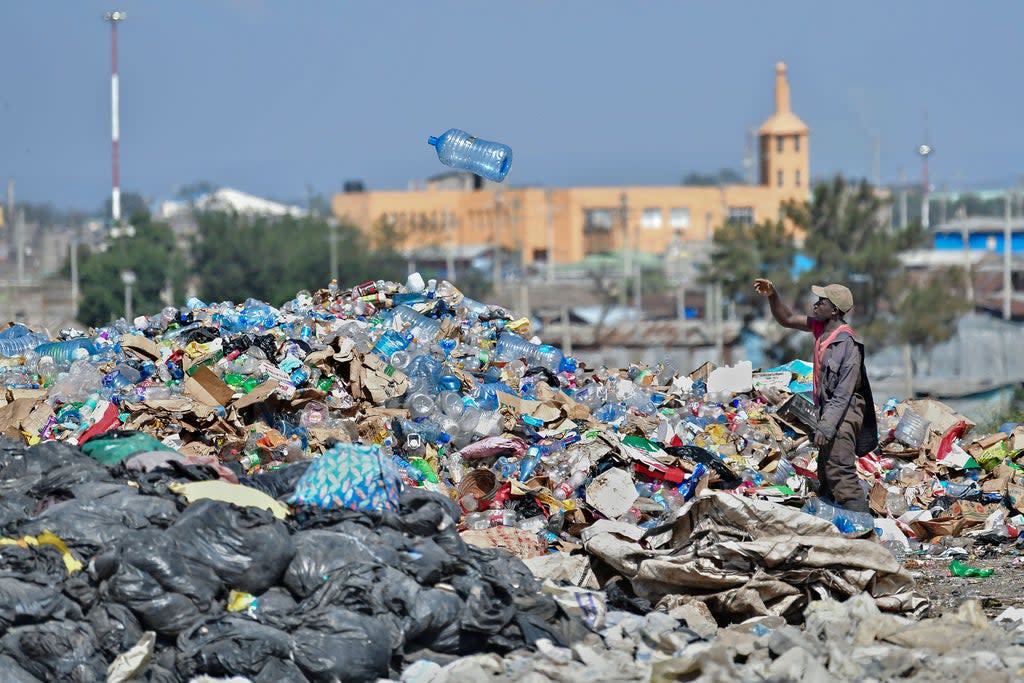Scientists create enzyme that breaks down plastic in hours instead of decades

Scientists have created a new enzyme which can break down plastics that typically take decades or centuries to degrade within a matter of days or even hours.
The team of researchers, including those from the University of Texas at Austin, say the novel enzyme could help unburden the planet from the billions of tonnes of plastic waste that continue to pile up in landfills and pollute both land and water.
In the study, published on Friday in the journal Nature, they say the enzyme can help in recovering and reusing plastics at the molecular level, and potentially supercharge recycling on a large scale and allow industries to reduce their environmental impact.
“The possibilities are endless across industries to leverage this leading-edge recycling process,” study co-author Hal Alper said in a statement.
“Beyond the obvious waste management industry, this also provides corporations from every sector the opportunity to take a lead in recycling their products. Through these more sustainable enzyme approaches, we can begin to envision a true circular plastics economy,” Dr Alper said.
Plastic pollution endangers wild and human life more every day. Can we clean this up? What to do with the waste once collected? With the Ellington,@at_lynd, and Zhang labs, we’ve developed an enzyme that can break down PET plastic: FAST PETase. https://t.co/rsICQ0ATUk @EnergyUT
— The Alper Lab (@LabAlper) April 27, 2022
In the research, scientists tested the effects of the enzyme on polyethylene terephthalate (PET) – a commonly used plastic polymer found in most consumer packaging such as biscuit or cookie containers, soft drinks bottles, fruit and salad packaging, and certain fibers and textiles – making up about 12 per cent of all global waste.
Scientists used an artificial intelligence (AI) model to cause new mutations to the natural enzyme PETase that allows bacteria to degrade PET plastics.
This AI model, they say, predicts which mutations in the enzymes would lead to the goal of quickly breaking down post-consumer waste plastic at low temperatures.
Via machine learning-informed enzyme evolution, we designed an enzyme capable of degrading post-consumer PET from 51 different plastic products in as little as 24 hours under moderate conditions. #pollution #synbio #Engineering Check out this time-lapse of plastic degradation: pic.twitter.com/EkbK5asEo8
— The Alper Lab (@LabAlper) April 27, 2022
With the enzyme, which the researchers are calling FAST-PETase, they say a complete “circular process” of breaking down the plastic into smaller parts could be achieved – a process called depolymerisation.
Researchers could then chemically put it back together in a process known as repolymerisation.
Scientists say in some cases the enzyme could help break down the plastic polymers fully to their individual components “in as little as 24 hours”.
“This work really demonstrates the power of bringing together different disciplines, from synthetic biology to chemical engineering to artificial intelligence,” Andrew Ellington, another co-author of the study, said.
First author, Hongyuan, supplied the plastic samples for degradation himself, saying “the plastic is for the microbes, and the food is for me”. See the degradation of 51 post-consumer plastic products in this figure from the paper published in @Nature pic.twitter.com/DOA218r215
— The Alper Lab (@LabAlper) April 27, 2022
While experts have argued that reduction in the use of plastics is a more sustainable solution than recycling, studies show that less than 10 per cent of the plastic already in circulation is recycled.
Besides throwing the rest away in a landfill, plastic is currently either recycled or burned, the latter being costly, energy-intensive and spewing noxious gas into the air.
Biological solutions take much less energy, but while research on enzymes for plastic recycling has advanced during the past 15 years, scientists say making enzymes that operate efficiently at low temperatures has been a challenge.
There are hopes that FAST-PETase can potentially bridge this gap, and effectively break down plastic at temperatures of less than 50 C.
In future, the scientists hope to scale up enzyme production to prepare for industrial applications, and also find ways to use it in environmental cleanups.
“When considering environmental cleanup applications, you need an enzyme that can work in the environment at ambient temperature. This requirement is where our tech has a huge advantage in the future,” Dr Alper said.

